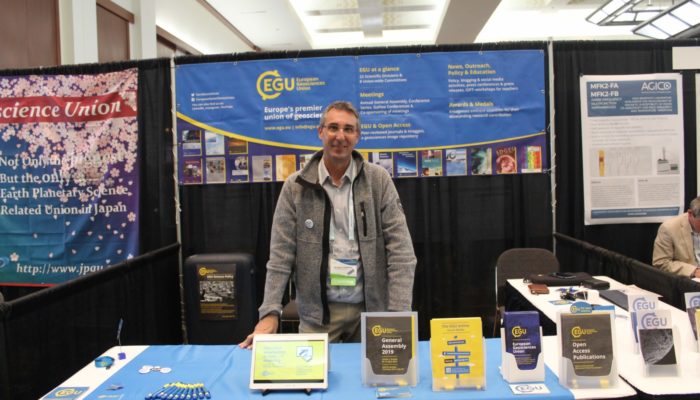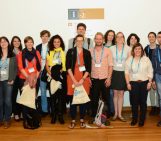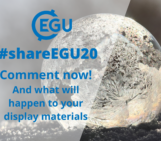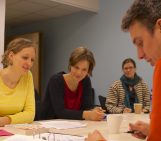
Hi Philippe, could you please introduce yourself and your role for our readers?
Thank you for inviting me today to provide this contribution as part of this celebration of the EGU 20th anniversary.
Being fascinated by the geological features and the beauty of the minerals since my early age, I had the opportunity to study Geology. I completed my PhD at the Institut de Physique du Globe in Paris on the physico-chemical and thermodynamic properties of silicate melts. I was then a post-doc at the Bayerisches Geoinstitut, Bayreuth before to make a habilitation in mineralogy at the department of Earth and Environmental Sciences of the Ludwig Maximilians University of Munich.
In 2010, I got the opportunity to join EGU and to develop the Executive Office in Munich. My role is to lead and manage the EGU Executive Office and to organise and monitor its day-to-day activities. Together with my colleagues at the Office, we implement the vision and values of the Union under the guidance of the Council.
Leaping back through time to the beginning, why was EGU founded?
It is difficult for me to fully address this question as EGU was founded in 2002 as a merger of two European co-existing organisations (the European Geophysical Society – EGS and the European Union of Geosciences – EUG) since I engaged with the Union in my role as Executive Secretary 8 years later.
Nevertheless, I can refer to the statutes of the organisation: “The purpose of the association is to advance studies and research in the Earth, planetary and space sciences. The association promotes the exchange of knowledge and collaboration in the Earth, planetary and space sciences.” This aim has remained unchanged for us.
The EGU was founded as a member-led organisation with a Council elected to represent the EGU membership. Let me take the opportunity here to remind the EGU members that participation in the EGU autumn election ensures the continuation of the Union’s well-established bottom-up structure. On the same line, every year the EGU holds its plenary meeting, where the membership gets together to learn about and vote on key Union activities, presented together with the financial report amongst other related matters. The plenary is usually scheduled on the Monday during the week of the General Assembly.
In addition to the pursuit of excellence in geoscience research, EGU is devoted to open science and open access research: the EGU publishes through Copernicus Publications a number of peer-reviewed open access, two-stage journals. Each journal has public peer-review and interactive public discussions covering various topics of the Earth, planetary and space sciences. The EGU journals ensure transparency of scientific quality assurance and provide freely accessible publications.
Since its founding the Union has grown tremendously both in size and ambition. How has EGU’s mission changed over the years?
This is indeed correct. The number of members have increased as well as the number of participants at the General Assemblies. The journal portfolio quickly grew along with the amount of published research. As well as this, scientific and societal challenges have also evolved, in turn changing the needs of both the public and the EGU community.
Whilst the the purpose and mission of the organisation has not changed – to foster fundamental and applied geoscience research that addresses key societal and environmental challenges for the benefit of humanity and the planet – new initiatives have been developed and existing ones have been expanded. For example, the EGU has recognized the importance of the Early Career Scientists (ECS) community and listens to them. The Union has therefore fostered their involvement within the Union and new initiatives to support them were developed; ECS members looking to become involved with the Union should contact the ECS Representative for their Division(s).
Since its establishment, the EGU valued accessibility, equality, diversity and inclusion. To further promote and support these matters in the Earth, planetary, and space sciences and especially in the EGU activities, the EGU has established an EDI Working Group that recently became a Committee.
To also address the growing societal and environmental challenges and their complexities, the EGU has advanced Science for Policy initiatives to encourage stronger science-policy partnerships between scientists and policymakers as well as to better inform the public. To this end, a Science for Policy Working Group has been established. More recently a Biodiversity Policy Priority Area has been identified by the Working Group in agreement with the EU Biodiversity Strategy for 2030 and a Biodiversity Task Force has been founded to coordinate all of EGU’s biodiversity-related activities.
Personally, I find it heartening to see the many ways in which EGU supports Early Career Scientists (ECS). Has this always been an area of focus for the Union?
This is indeed something that the Union very much values. As stated in its statutes, one of the activities is to offer “support for early career scientists by providing advice and fostering communication”. Since I have been at the Executive Office, the EGU has always continually developed initiatives to better support, hear and involve the ECS community.
Let me give you some examples:
Since 2003, the EGU promotes the overall quality of presentation by students and PhD candidates at its General Assemblies by granting a number of awards, such as the Outstanding Student and PhD candidate Presentation (OSPP) Awards. The recipients receive a registration waiver for the next EGU General Assembly and are invited to submit a paper (of which they are a first author) free of publication costs to one of the EGU journals.
This was followed by the Union-level ECS awards; established since 2004, these are formally known now as the Arne Richter Award for Outstanding Early Career Scientists. This portfolio was later expanded in 2011 through the Division Outstanding Early Career Scientist Awards, which grants an award for each Division.
In 2011 the Union also saw the first EGU fellowship at the Executive Office. One of its key tasks was to develop networks with ECS and to establish the internal structure of ECS activities which included a Union-level ECS representative, a Deputy Union-level ECS Representatives, and a Division ECS representative for each Division to represent the interests of the ECS membership. Since then the Executive Office has always had a point of contact for the Early Career Scientists at the Executive Office to support them, a role that you are currently and successfully filling, Simon.
The EGU has also been supporting the participation of ECS at its General Assemblies by granting each year a number of Roland Schlich travel support and virtual registration fee waivers. It should also be noted that, in addition to its newly established online participation waiver programme for scientists with a permanent affiliation in a low- or lower-middle income country, the virtual registration fees are waived for undergraduate and master students!
Beyond these larger-scale change, we cannot forget the incredible commitments made by the Union’s ECS volunteers, including the ECS Representatives and the teams. Through their ambition and creativity the Union has seen an incredible amount of growth, from simulating discussion and learning through the large variety of ECS-lead sessions at the General Assembly to providing a platform for ECS members to speak on issues of science and society through EGU’s blogs, and by organising digital networking and training events throughout the year.
Because of these many efforts, the Union’s ECS community has continued grow, from representing 30% of the entire membership in 2016 to 42% in 2019 before the pandemic outbreak. Almost half our membership is composed of ECS, and so hearing their voices is very important to us!
With two decades now behind it, could you tell our readers a bit about the direction the Union will take in the future?
The EGU has identified some strategic priorities until 2025 to strengthen its robustness and resilience and to develop its operational capabilities, including enhancing the capacity of its Executive Office.
As a member-led organisation, EGU will continue to listen to its members, to improve its communication with them, and to advance its services and benefits of the membership as well as its recognition of the EGU volunteers.
EGU will further persist to ensure equality of opportunity and diversity amongst EGU committees and boards, and more broadly within the Earth, planetary and space science community. EGU will expand its outreach and education initiatives as well as its engagement to further the public understanding of geoscience. EGU will also strengthen its sciences for policy activities to become a community voice for the geosciences and a “go to” source of expertise.
EGU will continue to develop its General Assembly, the largest geoscientific conference in Europe, to ensure it remains relevant, appropriate, attractive to the attendees, as well as more accessible, inclusive and sustainable. The EGU will ensure to maintain the resilience of its journals, scientific standing and recognition while continuing to uphold and promote the highest standards of scientific integrity, open science and open access research.
Finally, the EGU has undertaken a governance review of its decision-making and structures, to ensure the EGU structures retain appropriate scientific and professional diversity and equitable representation across the various boards as well as to make recommendations to Council for any changes so that the Union can deliver its mission and objectives and best respond to future needs of the membership.
Looking back now, what are some of your memorable EGU moments?
My initial contact with EGU was as a scientist. Contributing to the organisation of a large scientific conference (and not as a participant) was an extraordinary experience, especially when seeing the meticulous logistical approach of our partner (Copernicus meetings) as well as the dedication of the Programme Committee members and convener teams.
I will also never forget the outbreak of the COVID-19 pandemic and its unpredictable developments and how the EGU bounced back, thanks to the amazing efforts of volunteers, the Executive Office staff, our partner Copernicus and the understanding of our community. It has affected all of us, personally and professionally. Despite the challenging circumstances, EGU key activities were maintained, such as outreach to our members, publications or the General Assemblies; the “EGU 2020: Sharing Geoscience Online”, an exciting virtual experiment in response to the COVID-19 pandemic was organized in just six weeks!
With the COVID-19 pandemic, we were forced to step out of our comfort zone and learn to work differently. The pandemic forced us to react quickly and precipitated the implementation of some already planned initiatives. We are currently facing a challenging, but also very exciting time as we work to develop a supportive community environment. For example, the pandemic has accelerated our efforts to organize virtual meetings; EGU22 was our first hybrid conference! EGU, together with its partner Copernicus meetings, is now looking at all the experience gained this year to shape the next generation of the EGU General Assemblies.
I am also excited to see the advance of the EGUsphere, the EGU interactive community platform and preprint repository that hosts conference abstracts and presentations as well as preprints. EGUsphere includes a unique feature that encourages discussion and offers authors to have their submissions commented on by the public!
I am also looking forward to seeing further developments around accessibility, equality, diversity and inclusion in the EGU activities and within the Earth, planetary and space sciences community, as well as more engagements of scientific experts with policymakers.
Finally on a more personal note, I am also awaiting to have the opportunity to meet again in-person with EGU members and colleagues from our sibling societies.



